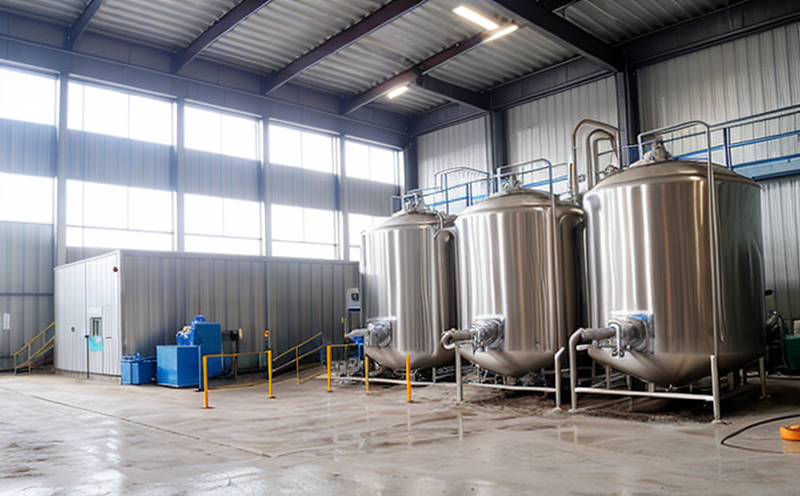APHA 2320B Alkalinity Test in Industrial Water
The APHA Method 2320B is a widely recognized procedure for determining the alkalinity of industrial water. Alkalinity, measured as the capacity to neutralize acid solutions, plays a critical role in maintaining water quality and ensuring efficient operation within various industrial processes.
The test measures the total amount of dissolved substances that can accept hydrogen ions (H+) from an acidic solution. These compounds include bicarbonate ions (HCO₃⁻), carbonate ions (CO₃²⁻), and hydroxide ions (OH⁻). Industrial water systems often have complex compositions, which necessitates precise testing to avoid operational inefficiencies and potential safety hazards.
Alkalinity is a key parameter in many industrial processes because it affects the pH of water and influences chemical reactions. For instance, in boiler feedwater, high alkalinity can lead to scaling and corrosion if not properly controlled. Similarly, in cooling tower systems, proper monitoring ensures that the system operates efficiently without excessive energy consumption or maintenance costs.
The APHA 2320B method involves titrating a water sample with standardized acid until no further color change occurs. The volume of acid required to reach this point indicates the alkalinity level. This test is essential for industries such as power generation, chemical manufacturing, and food processing where water quality directly impacts product safety and process efficiency.
The testing procedure adheres to strict guidelines outlined in APHA standards. Compliance with these methods ensures accurate and reliable results that can be trusted by regulatory bodies and internal management teams. By performing regular tests using this method, facilities can ensure optimal performance of their equipment while minimizing risks associated with poor water quality.
| Industry | Application |
|---|---|
| Power Generation | Maintaining boiler feedwater pH to prevent scaling and corrosion. |
| Chemical Manufacturing | Controlling reaction conditions for chemical synthesis processes involving acids or bases. |
| Food Processing | Ensuring product safety by preventing contamination from acidic environments. |
| Pharmaceuticals | Guaranteeing consistent formulation of alkaline-based medications and solutions. |
| Cleaning and Polishing | Optimizing rinse water quality to enhance product finish without leaving residues. |
| Paper Manufacturing | Managing pH levels in pulp digestion processes for improved efficiency. |
| Plastics and Polymers | Controlling the degradation rate of certain polymers by maintaining appropriate alkaline conditions. |
| Beverages | Ensuring optimal taste profiles through precise pH control during production stages. |
The importance of this test cannot be overstated. Properly conducted, the APHA 2320B method provides critical insights into water quality that can help prevent costly downtime, improve product quality, and enhance overall operational efficiency within industrial settings.
Why It Matters
The accuracy of the APHA 2320B test is crucial for maintaining water quality in various industrial applications. Properly measuring alkalinity helps prevent scaling, corrosion, and other issues that can arise due to improper pH levels. For instance, in boiler systems, excessive alkalinity can lead to scale buildup on heat exchangers, reducing their effectiveness and increasing maintenance costs.
In chemical manufacturing processes, maintaining the correct alkaline environment ensures optimal reaction rates and product yields. Any deviation from recommended parameters could result in suboptimal outcomes or even safety hazards. In pharmaceutical production, precise pH control is vital for ensuring that products meet stringent quality standards set by regulatory authorities like the FDA and EMA.
Cleaning and polishing operations also benefit from accurate alkalinity testing. Ensuring that rinse water has an appropriate pH level prevents residues from remaining on surfaces, leading to better final product finishes. This is particularly important in industries where surface quality directly impacts customer satisfaction.
Water quality management extends beyond just the industrial sector; it affects environmental sustainability as well. By minimizing waste and optimizing resource use through effective testing practices, companies contribute positively towards reducing their carbon footprint and promoting sustainable practices.
Benefits
Performing regular APHA 2320B tests offers numerous advantages for industrial facilities. Firstly, it allows for proactive identification of potential problems before they escalate into full-blown issues, thereby saving time and money on emergency repairs or replacements.
Secondly, consistent monitoring ensures compliance with industry standards and regulations set by organizations such as the EPA, OSHA, and international bodies like ISO. Compliance not only protects companies from penalties but also enhances their reputation among clients and stakeholders.
Thirdly, accurate alkalinity testing contributes to improved product quality by ensuring consistent performance across batches or production runs. This is especially important for industries where slight variations in pH can significantly impact end products' characteristics.
Fourthly, optimized water usage reduces operational costs associated with unnecessary chemical additions or excess consumption of fresh water sources. By carefully managing alkalinity levels, facilities can extend the life of their equipment and reduce overall maintenance expenses.
Lastly, maintaining proper pH balances helps protect both employees' health and safety by reducing exposure risks to hazardous substances present in improperly treated waters. This aligns with broader goals aimed at creating safer working environments across all sectors.
Industry Applications
The application of the APHA 2320B method spans multiple industries, each requiring precise control over alkalinity levels for optimal performance and safety. Below are some key areas where this testing plays a pivotal role:
| Industry | Application |
|---|---|
| Power Generation | Maintaining boiler feedwater pH to prevent scaling and corrosion. |
| Chemical Manufacturing | Controlling reaction conditions for chemical synthesis processes involving acids or bases. |
| Food Processing | Ensuring product safety by preventing contamination from acidic environments. |
| Pharmaceuticals | Guaranteeing consistent formulation of alkaline-based medications and solutions. |
| Cleaning and Polishing | Optimizing rinse water quality to enhance product finish without leaving residues. |
| Paper Manufacturing | Managing pH levels in pulp digestion processes for improved efficiency. |
| Plastics and Polymers | Controlling the degradation rate of certain polymers by maintaining appropriate alkaline conditions. |
| Beverages | Ensuring optimal taste profiles through precise pH control during production stages. |
In each case, accurate alkalinity testing ensures that industrial processes run smoothly and safely while meeting all relevant standards and expectations.





